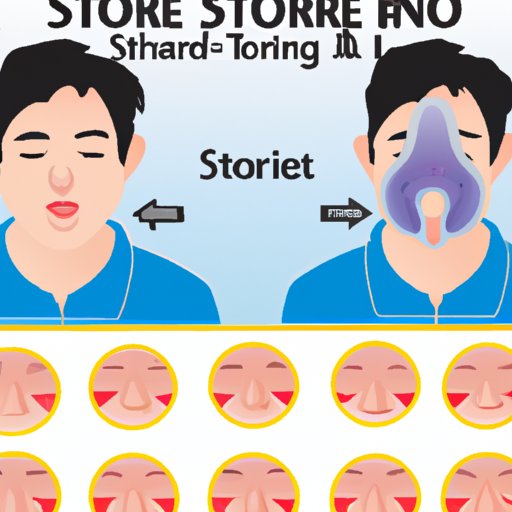Introduction
Snoring is a common problem affecting millions of people around the world. It is the noise created by turbulent airflow through the nose and mouth during sleep. Snoring can be caused by several factors, including narrow airways, poor muscle tone in the throat, allergies, and other medical conditions. Fortunately, there are a number of exercises and lifestyle changes that can help reduce or eliminate snoring.
Try Tongue Exercises to Strengthen Your Throat Muscles
Strengthening your throat muscles can help reduce or eliminate snoring. When your throat muscles are strong, they are better able to keep your airway open during sleep. This can help reduce snoring and improve overall sleep quality. Some recommended exercises for strengthening your throat muscles include tongue slides, tongue pushups, and throat rolls.
Tongue slides involve pressing your tongue against the roof of your mouth and sliding it up and down for 10 to 20 seconds. Tongue pushups involve pressing your tongue against the back of your teeth and pushing it up and down for 10 to 20 seconds. Throat rolls involve making a “humming” sound while keeping your throat relaxed.
Sleep on Your Side Instead of Your Back
Sleeping on your back can cause your tongue and soft palate to collapse into the back of your throat, causing you to snore. Sleeping on your side can help reduce snoring by allowing your airways to remain open. Additionally, sleeping on your side can help reduce back pain, improve digestion, and reduce heartburn.
If you’re used to sleeping on your back, it may take some time to adjust to sleeping on your side. To make the transition easier, try using a body pillow or special wedge pillow that keeps you in a side-sleeping position. You can also try taping a tennis ball to the back of your pajama top to prevent you from rolling over onto your back.

Avoid Alcohol and Sedatives Before Bedtime
Alcohol and sedatives can relax the muscles in your throat, leading to snoring. If you find yourself snoring after drinking alcohol or taking sedatives, it’s best to avoid them before bedtime. Instead, try having a cup of chamomile tea or taking an over-the-counter sleep aid.
Additionally, if you need help falling asleep, consider trying relaxation techniques such as deep breathing, progressive muscle relaxation, and visualization. These techniques can help reduce stress and anxiety, which can make it easier to fall asleep.

Use a Humidifier to Keep the Air Moist
Using a humidifier in your bedroom can help reduce snoring by adding moisture to the air. Dry air can irritate your throat and nasal passages, leading to snoring. Adding moisture to the air can soothe your throat and nasal passages, helping to reduce snoring.
When using a humidifier, make sure to follow the manufacturer’s instructions. It’s important to clean your humidifier regularly to prevent the growth of mold and bacteria. Additionally, it’s best to use distilled water rather than tap water, as tap water can contain minerals that can damage the humidifier.
Quit Smoking to Reduce Inflammation in the Nasal Passages
Smoking can irritate and inflame the nasal passages, leading to snoring. Quitting smoking can help reduce snoring by reducing inflammation in the nasal passages. There are many options available to help you quit smoking, including nicotine replacement therapy, prescription medications, counseling, and support groups.
If you’re having trouble quitting, talk to your doctor about other options. They may be able to recommend an alternative method of quitting that works best for you.

Try Nasal Strips or Other Nasal Dilators to Open the Nasal Passages
If your snoring is caused by a blocked nasal passage, using a nasal strip or other nasal dilator can help open the passage and reduce snoring. Nasal strips are adhesive strips that you place across your nose to help open your nasal passages. Other nasal dilators, such as nasal sprays, nasal plugs, and nasal strips, can also help open the nasal passages and reduce snoring.
It’s important to talk to your doctor before using any nasal dilator. Your doctor can recommend the best type of nasal dilator for you and provide advice on how to use it safely and effectively.
Conclusion
Snoring can be disruptive and annoying, but there are simple exercises and lifestyle changes that can help reduce or eliminate snoring. Strengthening your throat muscles, sleeping on your side, avoiding alcohol and sedatives, using a humidifier, quitting smoking, and using nasal strips can all help reduce snoring. With these tips, you can get a better night’s sleep and improve your overall health.
(Note: Is this article not meeting your expectations? Do you have knowledge or insights to share? Unlock new opportunities and expand your reach by joining our authors team. Click Registration to join us and share your expertise with our readers.)
